I'll take something that never happened for 1,000. If somebody goes to their manager and says I'm not taking this promotion because it'll destroy my life or to use the author's words that would be insubordination and they be terminated. There are ways to gracefully say no.
I Said No to a Promotion—And My Boss Found a Silent Way to Make Me Regret It
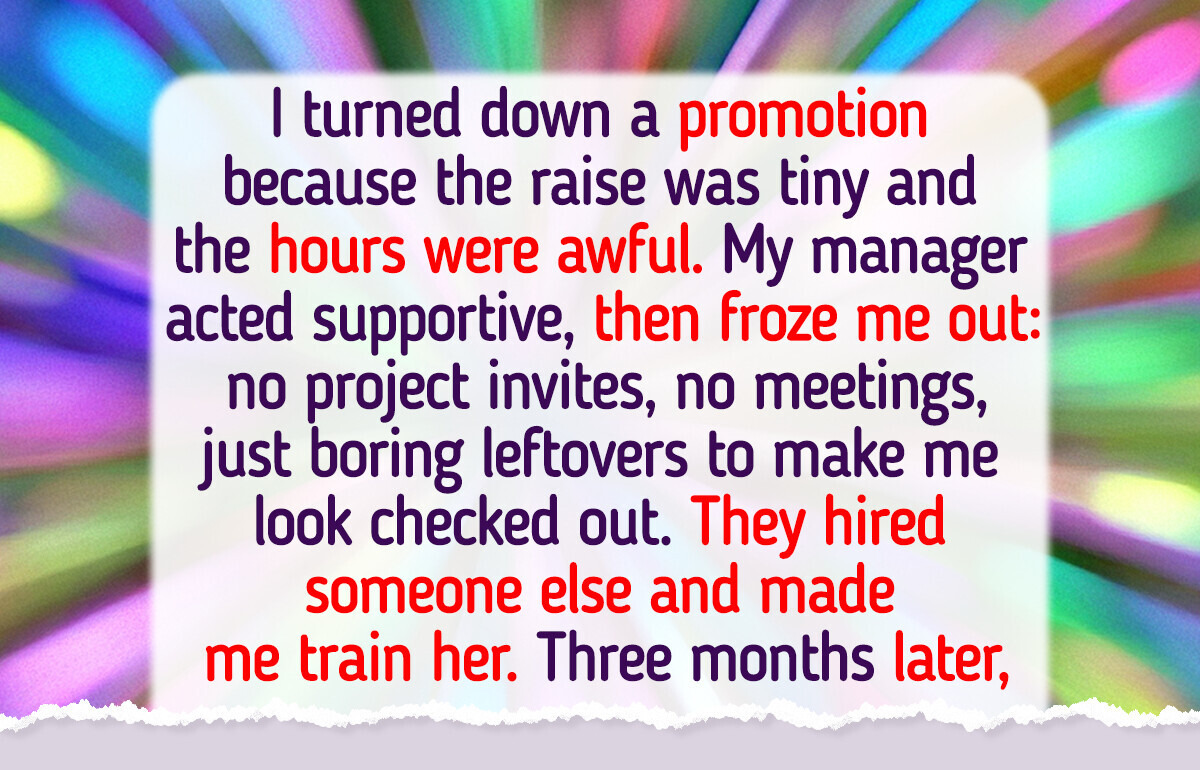
Not every work conflict looks like a conflict. Sometimes it looks like silence — fewer emails, missing invites, responsibilities quietly slipping away behind your back.
One Bright Side reader learned this the hard way after saying “no” to a promotion that offered more hours than life.
Her letter:

Hi Bright Side!
I said no to a promotion at work — politely. The raise was basically nothing, like “treat yourself to one extra coffee a week” small, but the hours? No remote days, no overtime, no life.
I told them, “I’m not trading my whole existence for a slightly bigger number.”
My manager smiled and said he respected my decision. He didn’t.
The punishment was quiet. Subtle. Project invites stopped hitting my inbox. Meetings happened without me.
My workload shrank to the boring leftovers — just enough to keep me busy, but small enough to make me look like I’d “checked out.” Slow, professional suffocation.
Then came the cherry on top: They hired someone else for the promotion and told me to train her.
At my performance review, he said, “You’re not showing leadership.”
I said, “You took everything off my plate.”
He just shrugged: “Perception matters.”
Three months later, upper management “accidentally” added me to a meeting and asked why my production tanked. I told the truth — calmly, factually. She sighed and said, “This is the third complaint about him.”
Two weeks later, he was “transitioned out.”
Then she said something no promotion could match, “Pick the projects you want. We’ll build the role around the life you’re trying to have.”
Best regards,
Lily
Thank you for trusting us with your story.
Your experience is a powerful reminder that saying “no” doesn’t make someone difficult — it makes them human.
How to Turn Down a Promotion Without Hurting Your Career.

For many people, a promotion feels like the ultimate sign of success — more responsibility, more recognition, and ideally, more pay. But the truth is, there are perfectly valid moments in life when saying “no, thank you” to a promotion is the healthiest, smartest move you can make.
Why Someone Might Decline a Promotion
• Protecting work—life balance
A large number of professionals are planning job changes in 2025 specifically to improve their work—life balance. A promotion often brings longer hours, heavier workloads, and more stress — all things that can tip that balance in the wrong direction.
• Loving the work, not the leadership
Some people shine brightest as specialists, not managers. Turning down a promotion can simply mean you understand where your strengths — and your happiness — truly lie.
• Personal circumstances
Health changes, family needs, or unexpected life events can make a demanding new role unrealistic, no matter how attractive it might seem on paper.
• Different long-term goals
Not every promotion fits the path you want for your career. Saying no can actually be a strategic move that keeps you aligned with your bigger vision.
• Feeling fulfilled where you are
If your current role already brings satisfaction and stability, taking on more responsibility might only add stress you’re not looking for.
How to Say No (Without Burning Bridges)
Sometimes, declining a promotion can be misunderstood as a lack of ambition. But handled thoughtfully, it can show confidence, self-awareness, and a strong sense of direction.
Here’s how to approach the conversation:
• Be honest and clear
Explain your reasons openly — whether they’re about personal priorities, strengths you want to focus on, or a career path that doesn’t match the new role.
• Take your time
Schedule a proper conversation. A rushed explanation can leave room for misunderstandings.
• Suggest alternatives
If you still want to grow, propose other ways you can contribute — new projects, responsibilities, or skills you’d like to develop.
• Stay future-focused
Show your willingness to keep learning. If you feel unprepared for leadership or people management, ask about training or support. Many employers — according to Robert Walters — are ready to invest in employee development over the coming year.
There is no universal checklist for when it’s “right” to turn down a promotion. Your career is personal — shaped by your values, your goals, and the kind of life you want outside of work. And choosing a path that honors all of that is a promotion in itself.
Comments
Related Reads
I Refuse to Earn Less Than New Hires After Years of Experience
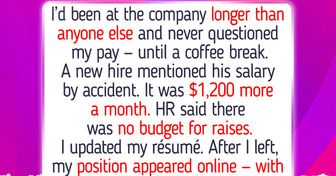
I Spoke to HR About Pay Inequality—And They Crossed a Line
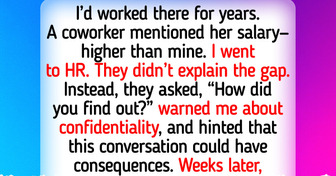
15+ Stories of Kindness That Changed How People See the World

I Refuse to Stay Quiet After My Junior Colleague Took the Promotion I Deserved
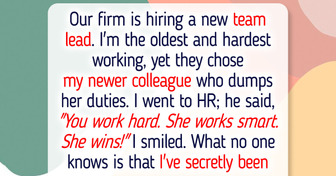
My Sister Quit Her Job to Care for Our Sick Mom, Now She Wants More Inheritance
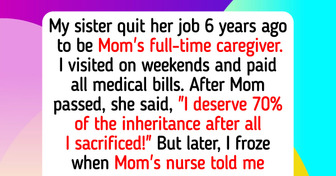
I Refused to Knit My Coworker a Free Blanket, and Now HR Is Involved

15 Stories That Inspire Us to Stay Kind Even When Life Feels Unfair

20+ Moments That Prove Quiet Kindness Is the Only Language Everyone Speaks
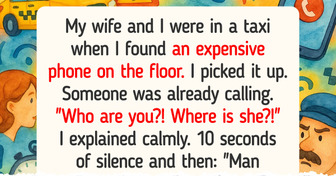
I Refuse to Let My Entitled Daughter Steal the Life I’ve Been Saving For

13 Stories of Quiet Kindness That Show Superhuman Strength in Ordinary People

I Refuse to Give Up the Passenger Seat for My MIL—She Should Learn Her Place

15 Stepchildren Who Finally Saw Their Stepparents as Real Family
